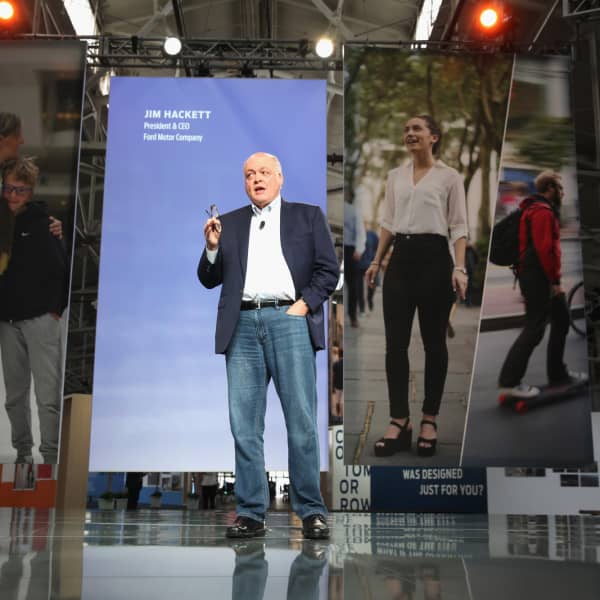Greg Glassman is both a college dropout and an atheist, yet he has been invited to speak both at the Harvard Business School and the Harvard Divinity School.
The 60-year-old gymnast-turned-entrepreneur sees the irony. And he kind of enjoys it.
"There has to be something wrong with you to not find that interesting, amusing. It's a lot to think about," Glassman told CNBC at the Iconic conference in Boston.
Glassman, who is often found wearing jeans and a T-shirt and a backward cap, has been invited to speak at both elite graduate programs of the prestigious university in Cambridge, Massachusetts, because he is the founder and the 100 percent owner of CrossFit, a fitness brand that has exploded in popularity. He's both rich and revered.
The former gymnast opened the first "box," or specialized gym, in 1995. Today, there are 13,546 active affiliate franchises in 144 different countries. There are potentially 4 million CrossFitters, though that's a squishy figure to nail down, even for Glassman. CrossFit headquarters won't divulge revenue or profit, but most affiliates pay annual dues of $3,000.
That's enough seriously rapid growth to pique the interest of the MBA students, to whom Glassman says, with characteristic irreverence, that the only way he has made money is to not think about making money.
"My message at the business school is that business isn't about making money. Money is what makes the business go, it's like what jet fuel is to an airline, but the purpose of an airline is not to burn jet fuel. It's to move passengers from A to B safely and comfortably. The more successful you are, it's reasonably certain that you will burn more jet fuel, but you don't grow the business by burning jet fuel. That's what money is to a business."
Meanwhile, when he was speaking at the business school about the growth of his empire, Glassman mentioned the way the CrossFit community has been called "a religion run by a biker gang."
You think religion is dying. We are saying religion is changing.Casper ter Kuileco-author of 'How We Gather'
That got the attention of a couple of graduate students at the Harvard Divinity School who have researched the way religion has been finding new homes outside of the church. They say that the fundamental human longing for a congregated support network exists separate from an interest in formal religion.
In a written statement announcing Glassman's talk on campus, Casper ter Kuile, co-author of the study "How We Gather," focusing on what religious culture looks like to millennials, said, "We are offering a challenge, and this is more of a challenge to the world of religion, that if you think religion is dying, we are saying religion is changing."
One in three millennials do not belong to any sort of faith-based religion and even more do not go to church. Meanwhile, two-thirds of all Americans who are unaffiliated still report believing in God, according to the report. Other nonreligious communities studied, besides CrossFit, include SoulCycle and Camp Grounded, a summer camp for adults.
"What you will see among young people is that they are indeed participating in communities and they are in communities that are some ways mirroring the function that religious communities have served," said Angie Thurston, the other co-author of the Harvard Divinity School study of non-faith-based religions.
"These are communities that are helping people aspire toward goals, transform themselves and work toward change while holding each other accountable to make things better. They are inspiring creativity and inspiring people to find their purpose and mission in life. All these kinds of key functions that a community can serve," she said.
CrossFit fits into that paradigm.
CrossFitters are unmatched in their devotion to and belief in a lifestyle of intense, varied workouts paired with a high protein, low-carb diet. Spending time sweating and struggling with people who share a common life philosophy is an organic recipe for bonding and community building.
CrossFit is family, laughter, love, and community. I can't imagine my life without the people I've met through it.Ali HuberlieCrossFit enthusiast
For example, one CrossFitter says that when she and her boyfriend moved, they chose the location of their new home based on their gym, not their office. "My CrossFit box is everything to me. I've met my boyfriend and some of my very best friends through CrossFit," says Ali Huberlie, who was interviewed by Kuile and Thurston for the study. "At our box, we have babies and little kids crawling around everywhere, and it has been an amazing experience to watch those little ones grow up. CrossFit is family, laughter, love and community. I can't imagine my life without the people I've met through it."
If CrossFit is a religion, then Glassman is the pope. When CrossFitters see Glassman, they ask for his autograph and take pictures with him whenever possible. They fawn. He is their leader, all of which Glassman professes to find slightly uncomfortable.
Glassman feels more comfortable talking about the why CrossFit is a modern-day religion than how successful the fitness franchise is as a business. He is more interested in changing people's lives than he is in being wealthy, he says.
"I have a lot in common with those kids, the ones at the Harvard Divinity School, more so at the Divinity School than at the Business School," says Glassman. "I have more in common with wanting to change the world and improve people's lives than just to make money."
There are other similarities between CrossFit and organized religion.
For example, from Glassman on down, those who have bought into the community don't care about what others outside the group think of their devotion.
"I don't really give a flying f--- what anyone thinks of me or what we are doing. People's opinions of my efforts don't matter, what matters to me is the considered, rational opinions of intelligent people about our take on metabolism. That's what matters," says Glassman.
Also, Glassman presents himself as a savior of sorts. He says CrossFit is a cure for ailments ranging from obesity to anxiety and is a weapon against the national epidemic of chronic disease. According to the gospel of CrossFit, other exercise regimens and diets are fraudulent.
Health and happiness among members increase in direct proportion to the hard work and devotion put in, according to CrossFit culture. That's good for community building, and it's also good for business.
"It's the sacrifice, it's the soreness, it's the getting up in the morning, it's doing one more rep when you think you can't," says Glassman. "It's drawing from somewhere really deep, it's learning that ultimately the best things in life come out of commitment, out of sacrifice, out of working harder than the other guy, getting up earlier, staying up late."
Christians and CrossFitters alike, for example, are encouraged by the idea that they are living well and making the right decisions.
"These things are actually religious. You should treat these institutions as religious options that people find," said Kuile. "That's a difficult thing to hear if you are a church or for other denominations. At the same time, it's exciting."
More from iCONIC:
12 of the most famous Harvard grads -- and dropouts -- of modern time
Bogle: What I learned from my biggest investing mistake
How 9 iconic American brands discovered their names





